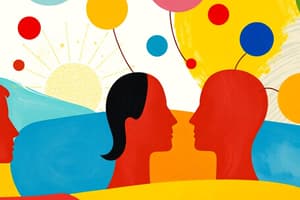Podcast
Questions and Answers
What characterizes the Unconscious Competence stage of skill development?
What characterizes the Unconscious Competence stage of skill development?
- Skills are performed automatically without conscious effort. (correct)
- Skills require conscious effort to perform.
- Individuals are unaware of the necessity to develop skills.
- Individuals are aware of their lack of skills.
Which area of the Johari Window represents information known by both the individual and others?
Which area of the Johari Window represents information known by both the individual and others?
- Hidden Area
- Unknown Area
- Blind Area
- Open Area (correct)
Which stage of the Spiral of Understanding signifies the acknowledgment of one's lack of skill?
Which stage of the Spiral of Understanding signifies the acknowledgment of one's lack of skill?
- Conscious Incompetence (correct)
- Unconscious Incompetence
- Conscious Competence
- Unconscious Competence
How is Interpersonal Communication best defined?
How is Interpersonal Communication best defined?
What is a primary method of increasing the Open Area in the Johari Window?
What is a primary method of increasing the Open Area in the Johari Window?
What does 'Inter' in Interpersonal Skills refer to?
What does 'Inter' in Interpersonal Skills refer to?
Which area of the Johari Window is characterized by information known to others but unknown to the individual?
Which area of the Johari Window is characterized by information known to others but unknown to the individual?
What type of environment is most effective when teams operate within the Open Area of the Johari Window?
What type of environment is most effective when teams operate within the Open Area of the Johari Window?
During which stage might an individual be unaware of their need to develop a specific skill?
During which stage might an individual be unaware of their need to develop a specific skill?
Which area is reduced through self-discovery and observation from others?
Which area is reduced through self-discovery and observation from others?
Flashcards are hidden until you start studying
Study Notes
Spiral of Understanding Skills
- The Spiral of Understanding Skills is a model that utilizes four stages of skill development:
- Unconscious Incompetence: The individual is unaware of their lack of skill and does not realize they need to learn it.
- Conscious Incompetence: The individual is aware of their lack of skill and recognizes the need to learn it.
- Conscious Competence: The individual has learned the skill and can perform it consciously with effort.
- Unconscious Competence: The individual has mastered the skill and can perform it automatically without conscious effort.
Interpersonal Skills
- Interpersonal skills involve interaction between two or more people.
- Interpersonal communication is a transactional form of communication that involves mutual influence typically for the purpose of managing relationships.
The Johari Window
-
The Johari Window is a model that helps to understand self-awareness and interpersonal relationships.
-
The Johari Window has four quadrants:
- Open Area: Information that is known to both the individual and others.
- Blind Area: Information that is known to others but not the individual.
- Hidden Area: Information that is known to the individual but not to others.
- Unknown Area: Information that is unknown to both the individual and others.
Increasing the Open Area
- The Open Area can be increased by reducing the Blind Area through feedback from others.
- The Hidden Area can be reduced by disclosing parts of the self to others.
- The Unknown Area can be reduced through observation, self-discovery, and feedback from others.
Perceptions of Self and Others in Interpersonal Communication
- The Self-concept is how you see yourself and is influenced by:
- Others' images of you (looking glass self).
- Social comparisons (upward and downward).
- Cultural teachings.
- Self-evaluation.
Self-awareness
- The Johari Window emphasizes four aspects of self-awareness:
- Open: Known to self and others
- Blind: Known to others but not self
- Hidden: Known to self but not others
- Unknown: No one knows
Johari Window: Self-Awareness and Development
- The model helps understand and train self-awareness and personal development for improving communication, relationships, group dynamics, and team development.
Open/Free Area
- The Open area or "arena" is a space for good communication, cooperation, free from confusion, conflict, and distrust.
- Team members are most effective and productive in this area.
Blind Area
- Also known as the blind self or blind spot.
- Teams and managers can help reduce this area by providing feedback and encouraging disclosure, which in turn increases the Open Area.
Hidden Area
- Represents information, feelings, etc., that a person knows about him/herself but does not reveal to others.
- It is impacted by organizational culture and working environment, influencing people's willingness to be open.
Unknown Area
- This area can be revealed through self-discovery, observation by others, collective/mutual discovery, or counseling. The process is sensitive and managers can create an environment to encourage it.
- The Unknown Area can be accessed by others and through self-discovery. Managers should provide an environment conducive to this process.
Stages of Self Exploration
- Self-awareness
- Self-acceptance
- Self-realization
Growing in Self-Awareness
- Ask yourself about yourself.
- Listen to others.
- Actively seek information about yourself.
- See your different selves.
- Increase your open self.
Self-acceptance
- Accepting all aspects of oneself, including the positive, negative, and neutral.
- This can be challenging but is important for working toward change.
Studying That Suits You
Use AI to generate personalized quizzes and flashcards to suit your learning preferences.




